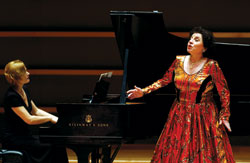George Frideric Handel’s 1711 opera Rinaldo, set during the Crusades, climaxes with military swagger in the aria “Or la tromba,” as the title character rouses himself to storm and capture Jerusalem. Four trumpets spur the hero on, and Handel has the singer echo them, as if dueling. On her recording of the aria, Polish alto Ewa Podles matches the trumpet trill for trill, arpeggio for arpeggio, thrust for thrust, her brilliantly sonorous volleys of rapid 16th notes swelling with the jubilant martial pride described in the lyrics. The top of her range is warm, clarion, not a bit shrill; the well-focused bottom has a distinctly masculine color, not a bit thick. But there’s more in Podles’ arsenal than acrobatics; she brings an opulent, throbbing tone and heart-clutching emotional commitment to the lament “Cara sposa” from the same opera.
Among the stunning singer’s fans is Seattle Opera’s general director, Speight Jenkins, who’s bringing her here to play not merely a general but an emperor. When SO presents Handel’s Julius Caesar in Egypt (or Giulio Cesare in Egitto) later this month, the 5-foot-5-inch Podles will be in the title role.
A woman singing Caesar? Well, you don’t become an opera fan without a healthy ability to suspend disbelief—to accept a 63-year-old soprano as the 15-year-old Madame Butterfly, or Pavarotti as a starving playwright in a Parisian garret. During the Baroque period, composers like Handel wrote the lead roles, whether male or female characters, for high voices. The male soprano roles, such as Caesar, were sung by castrati: singers who had been castrated before puberty, so they could retain a woman’s range and flexibility while developing a man’s lung, and carrying, power. The best of them were the toast of Europe, compensated for their loss with magnificent fame and wealth.
The practice died out 150 years ago, not only because of its barbarity but because dramatic verisimilitude, or at least attempts thereat, became a greater priority for 19th-century opera composers. (The audience’s continued fetish for high notes, in a male voice that actually sounded male, led to the rise of the star tenor.) The recent rebirth of interest in Baroque opera, and particularly in Handel’s, required castrato substitutes, singers who could again manage the acrobatic ornateness—scales and roulades at top speed—of the vocal writing. Beverly Sills and Marilyn Horne were in the forefront of this revival in the ’60s and ’70s. Soon after came the resurgence of the countertenor—a man with a highly developed falsetto—a development that makes the male leads open to either men or women.
For Jenkins, there was never a question. He saw Podles, 54, as Caesar in Toronto several seasons ago and says it was “astonishing.” “That whole afternoon, I was just mesmerized by her singing.” Jenkins is even borrowing Toronto’s sets in order to match the production.
Seattle first heard Ewa Podles (pronounced AY-vah PODE-lesh) in 2003 in Bellini’s Norma. The title role is a notoriously challenging diva vehicle, but Podles as Adalgisa—ostensibly the seconda donna, Norma’s sidekick/romantic rival—threatened to steal the show. She takes over a stage simply by walking on, even before she begins to sing. There’s an old-school kind of grandeur about her, a command that projects to the back of the top tier, of the sort that opera mavens who like to wax nostalgic (i.e., all of them) lament the loss of in the current generation of singers. Something about Podles onstage evokes bygone days of the European celebrity opera star: steamer trunks full of furs, Russian wolfhounds with jeweled collars, high tea with Marie of Romania.
She specializes in Rossini, who, a century after Handel, was the last opera composer to regularly write male characters for women’s voices. She’s also scored in Verdi, and even sent up her own imperious persona as the sternly moralizing “Public Opinion” in Offenbach’s satiric Orpheus in the Underworld. In Seattle Opera’s 2005 Ring, she sang three roles: earth mother Erda, who appears in both Das Rheingold and Siegfried, and the soothsaying First Norn in Götterdämmerung. Her voice, elemental and oracular, must have been just what Wagner had in mind as his voice of destiny, rising from the earth (in Rheingold, Podles literally did make her entrance on a stage elevator, emerging from a cleft draped in mossy green) and prophesying the downfall of the gods. I was amazed to hear from Jenkins that she learned both Siegfried and Götterdämmerung for the first time for this production.
But Podles is by no means content to just stand, sing, and let herself be worshiped. Despite her glamorous old-world air, she demonstrates a commitment to acting, to doing her part in making an opera performance a convincing theatrical whole, which seems distinctly contemporary. Jenkins reports that both Stephen Wadsworth and Peter Kazaras, stage directors of the Ring and Norma, found her easily assimilated: “What you’re dealing with with Ewa is basically an older style. In our experience here, she’s quite easy to direct—she was very eager to do exactly what Stephen wanted, and she really worked on it and she had to work hard because it was very different from anything she’d done before. And that’s why she told me the Ring was one of the great experiences of her life.”
She’ll be back in Seattle in June as the soloist in the Seattle Symphony’s performance of Mahler’s Symphony No. 3— oracular again, singing a text from Nietzsche’s Also sprach Zarathustra: “The world is deep/And more deeply conceived than the day./Deep is its pain. . . .”







